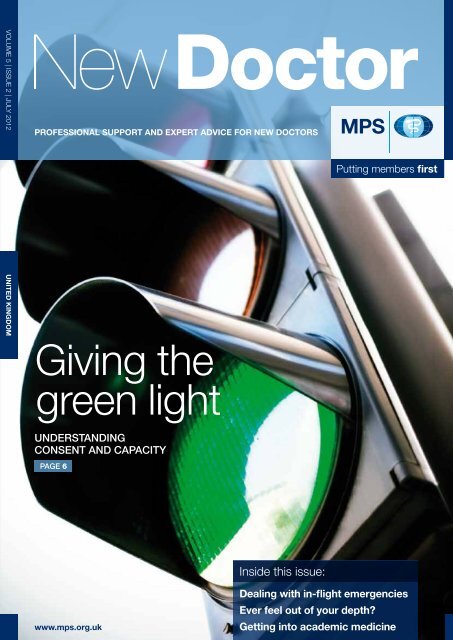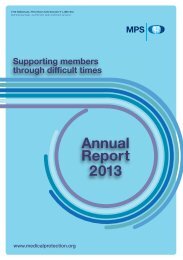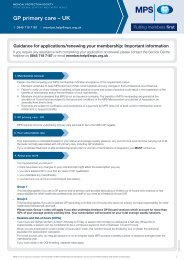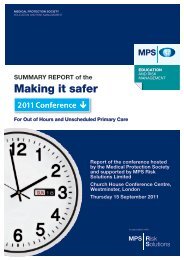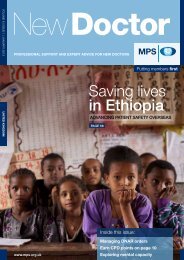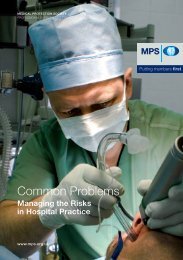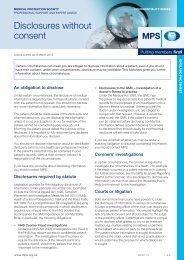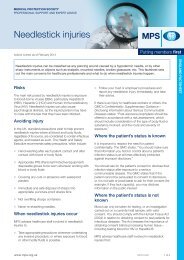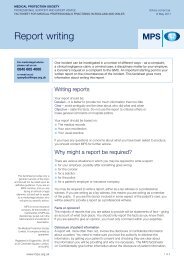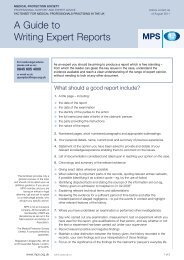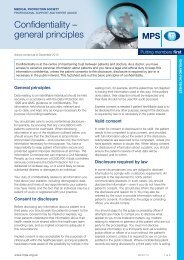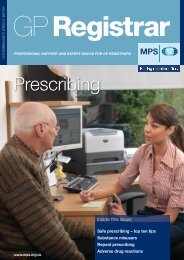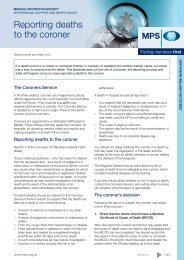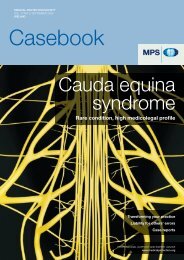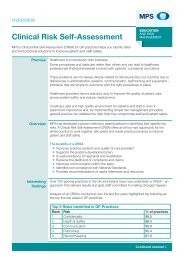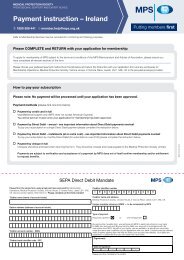New Doctor - Medical Protection Society
New Doctor - Medical Protection Society
New Doctor - Medical Protection Society
Create successful ePaper yourself
Turn your PDF publications into a flip-book with our unique Google optimized e-Paper software.
VOLUME 5 | ISSUE 2 | JULY 2012<br />
UNITED KINGDOM<br />
PROFESSIONAL SUPPORT AND EXPERT ADVICE FOR NEW DOCTORS<br />
Giving the<br />
green light<br />
UNDERSTANDING<br />
CONSENT AND CAPACITY<br />
PAGE 6<br />
www.mps.org.uk<br />
Inside this issue:<br />
Dealing with in-flight emergencies<br />
Ever feel out of your depth?<br />
Getting into academic medicine
MEDICAL PROTECTION SOCIETY<br />
EDUCATION AND RISK MANAGEMENT<br />
Looking for evidence<br />
for your ePortfolio?<br />
MPS is committed to the value<br />
of education and training.<br />
As well as helping you<br />
provide the best care for<br />
your patients, we want to<br />
support your development.<br />
On pages 6-8 of this edition of <strong>New</strong> <strong>Doctor</strong> magazine<br />
you will find an article on consent and capacity.<br />
Once you’ve read the article you can register for our<br />
E-learning platform and complete two online learning<br />
modules on the themes covered in the article.<br />
Once you’ve completed the modules you can<br />
download a certificate of completion as evidence<br />
of your learning for your ePortfolio.<br />
READ THE<br />
ARTICLE ON<br />
PAGES 6-8
Inside this issue of <strong>New</strong> <strong>Doctor</strong>…<br />
4 Update<br />
A round up of all the latest news and top events<br />
for foundation doctors<br />
5 Hot topic: Competency<br />
MPS medicolegal adviser Dr Jayne Molodynski<br />
explains why it is important to recognise the limits<br />
of your competence<br />
5 From ward to world<br />
Dr Imran Qureshi, <strong>Doctor</strong>s Advancing Patient Safety,<br />
describes why more junior doctors should sign up<br />
Medicolegal features<br />
6 Essential learning:<br />
Consent and capacity<br />
Earn CPD points by reading this feature and learning<br />
about consent and capacity, by Dr Gordon McDavid<br />
10 Out of my depth<br />
Many new doctors are pushed to the limits of<br />
their competence; if you feel out of your depth<br />
speak up before it’s too late, says Dr Jo Pointon<br />
14 Dilemma: Dealing with an<br />
in-flight emergency<br />
The last thing you want to hear when on board a<br />
long-haul flight: “Is there a doctor on board?” Dr<br />
Clement Lau shares what happened to him<br />
Specialty features<br />
9 A day in the life of…<br />
an F2 in public health<br />
Dr Yasmin Akram will not be dining in her<br />
favourite restaurant in a hurry after this placement<br />
12 How to work in…<br />
academic medicine<br />
A career in academic medicine opens up a<br />
chance to work at the frontier of medical science,<br />
writes Dr Cathy Symonds<br />
15 Book review<br />
Dr June Tay reviews David Sokol’s book Doing<br />
Clinical Ethics<br />
EDITOR-IN-CHIEF Dr Gordon McDavid EDITOR Sara Williams CONTRIBUTORS Dr Jo Pointon,<br />
DAPS, Dr Imran Qureshi, Dr June Tay, Dr Yasmin Akram, Dr Hannah King, Dr Clement Lau DESIGN<br />
Jayne Perfect PRODUCTION MANAGER Philip Walker MARKETING Peter Macdonald, Kim<br />
Beaumont EDITORIAL BOARD Dr Stephanie Bown, Gareth Gillespie, Dr Paul Mackin, Dr Chris<br />
Godeseth, Dr Jayne Molodynski, Ben Simpson, Shelley McNicol <strong>New</strong> <strong>Doctor</strong> <strong>Medical</strong> <strong>Protection</strong><br />
<strong>Society</strong>, Granary Wharf House, Leeds, West Yorkshire LS11 5PY Tel: 0113 241 0530 Fax: 0113 241 0500<br />
GET THE MOST FROM<br />
YOUR MEMBERSHIP<br />
Visit our website for publications,<br />
news, events and other information:<br />
www.mps.org.uk<br />
Follow us on Twitter at:<br />
www.twitter.com/MPSdoctors<br />
Opinions expressed herein are those of the authors. Pictures should<br />
not be relied upon as accurate representations of clinical situations.<br />
© The <strong>Medical</strong> <strong>Protection</strong> <strong>Society</strong> Limited 2012. All rights are reserved.<br />
GLOBE (logo) (series of 6)® is a registered UK trade mark in the<br />
name of The <strong>Medical</strong> <strong>Protection</strong> <strong>Society</strong> Limited.<br />
Cover: © mbbirdy/iStockphoto.com<br />
We welcome contributions to<br />
<strong>New</strong> <strong>Doctor</strong>. Please contact us on<br />
0113 241 0377 or<br />
email sara.williams@mps.org.uk<br />
4<br />
6<br />
10<br />
12<br />
Welcome<br />
Dr Gordon McDavid – Editor-in-chief<br />
MPS Medicolegal Adviser<br />
Welcome to your latest edition of<br />
<strong>New</strong> <strong>Doctor</strong> and my first edition as<br />
Editor-in-Chief. I would like to begin<br />
(whilst attempting not to sound too<br />
much like an acceptance speech for<br />
an Oscar) by thanking Dr Angelique<br />
Mastihi for her extensive input into<br />
<strong>New</strong> <strong>Doctor</strong> since becoming Editorin-Chief<br />
in 2008. I’m sure you’ll agree<br />
she has done an excellent job and I<br />
hope to continue the good work.<br />
I joined MPS as a medicolegal<br />
adviser in 2011 having completed my<br />
medical degree at the University of<br />
Glasgow and having worked mostly<br />
in respiratory and general medicine.<br />
I have previous experience in the<br />
medicolegal field and to keep me<br />
out of mischief I’m currently working<br />
towards a masters degree in medical<br />
law and ethics and membership to the<br />
faculty of forensic and legal medicine.<br />
Enough about me… this edition<br />
of <strong>New</strong> <strong>Doctor</strong> revolves around<br />
competency, a really fundamental<br />
issue for doctors at all stages of their<br />
careers. It is vital for doctors to know<br />
their limits and seek help appropriately.<br />
Imagine finding yourself in the difficult<br />
position of feeling out of your depth,<br />
but being the only one available. Have<br />
a look at Dr Pointon’s candid account<br />
of a real-life scenario on page 10, or<br />
Dr Lau’s description of being called to<br />
assist with a medical emergency midflight.<br />
You might also like to check<br />
out the interesting feature article,<br />
which can earn you CPD points or<br />
the specialty features which provide<br />
a fascinating insight into careers you<br />
may not have considered.<br />
I hope you enjoy this edition of<br />
<strong>New</strong> <strong>Doctor</strong>.<br />
3<br />
CONTENTS<br />
NEW DOCTOR | VOLUME 5 | ISSUE 2 | 2012 | UNITED KINGDOM www.mps.org.uk
4<br />
UPDATE<br />
NEW DOCTOR | VOLUME 5 | ISSUE 2 | 2012 | UNITED KINGDOM www.mps.org.uk<br />
Update<br />
GMC<br />
launches<br />
new tribunal<br />
service for<br />
UK doctors<br />
A<br />
new tribunal service to decide on the<br />
fitness to practise of UK doctors was<br />
launched on 11 June, in the biggest<br />
Above: Niall Dickson, chief<br />
executive of the GMC<br />
Right: David Pearl, the<br />
shake up of medical regulation in the United judge and independently<br />
Kingdom since the formation of the General<br />
<strong>Medical</strong> Council more than 150 years ago.<br />
appointed chair of MPTS<br />
The <strong>Medical</strong> Practitioners Tribunal Service MPTS will strengthen professional and public<br />
(MPTS), based in Manchester and headed confidence that our hearings are impartial, fair<br />
by a judge, will be part of the GMC, but will and transparent – the fact that the service is<br />
operate separately from it and be accountable led by a judicial figure who has a direct line to<br />
to parliament. The GMC will continue to parliament should provide that assurance.”<br />
investigate and prosecute cases.<br />
David Pearl, the judge and independently<br />
MPTS panels have the power to, in the most appointed chair of MPTS, said: “One of my<br />
serious cases, remove or suspend a doctor earliest priorities is to make improvements<br />
from the medical register or place restrictions to the way that panelists are trained and<br />
on their practice. They can also take early performance managed through regular<br />
action by considering cases before a full appraisal and quality assurance, which will<br />
fitness to practise hearing, where it may be bolster the quality of decision making.”<br />
appropriate to place restrictions on a doctor’s Later this year the GMC plans to pilot a<br />
practice immediately or suspend their practice proposed new system of consensual disposal,<br />
while investigations proceed.<br />
which would allow a doctor to avoid a public<br />
The move paves the way for far reaching reforms hearing by accepting a suggested sanction.<br />
of the fitness to practise procedures expected to The doctor would attend a meeting to explain<br />
come into force over the next few years.<br />
the circumstances and put forward mitigation<br />
Niall Dickson, the chief executive of the at an early stage.<br />
GMC, said: “Although panels already make Also this year, the GMC will be deploying<br />
their decisions independently, it is important regional liaison officers to liaise with employers<br />
that their autonomy is clear and that the and support responsible officers, with the aim<br />
oversight of their work is quite separate from of identifying and tackling underperforming<br />
our investigatory activity. We hope that the doctors early.<br />
For more information visit: www.gmc-uk.org/news/13286.asp<br />
Event When Where What Further information<br />
MPS Communication Skills<br />
Workshops<br />
Throughout<br />
year<br />
Across UK<br />
Careers Advice for Trainees 11 September Durham<br />
Getting to Grips with Law and<br />
Ethics: Medicolegal Skills for<br />
Surgeons in Training<br />
28 September London<br />
BMJ Careers Fair 19/20 October London<br />
Mix with other specialties and lower your risk at MPS’s<br />
popular workshop<br />
The UK Foundation Programme Office, Northern Deanery<br />
and <strong>Medical</strong> Education England, are jointly hosting this event<br />
MPS and ASIT present this joint one-day conference, which<br />
confers essential skills for surgeons in training<br />
Useful for any medical graduate, it covers CV writing,<br />
interview skills, career planning and more<br />
ABEL MITJA VARELA/ISTOCKPHOTO.COM<br />
NEWS IN BRIEF<br />
Junior doctors told<br />
to shadow jobs to<br />
improve safety<br />
Junior doctors will have<br />
to spend at least four<br />
days shadowing their<br />
first job in the NHS<br />
before starting work,<br />
the government has<br />
announced. The new<br />
system will be introduced<br />
in England this August<br />
when the new intake of<br />
junior doctors is taken on.<br />
NHS medical director<br />
Professor Sir Bruce<br />
Keogh said the move<br />
would help improve<br />
patient safety. Sir Bruce<br />
said: “This shadowing<br />
period could potentially<br />
save lives and will equip<br />
new junior doctors with<br />
the local knowledge<br />
and skills needed to<br />
provide safe, high<br />
quality patient care.”<br />
Dr Tom Dolphin, of<br />
the BMA, said: “I think<br />
it will really help doctors<br />
hit the ground running.<br />
It is a stressful time<br />
starting your first job so<br />
this will be a good way<br />
of easing that.”<br />
The decision to<br />
introduce shadowing<br />
comes after pilots have<br />
been carried out in<br />
various places. In Bristol<br />
mistakes new doctors<br />
made in their first four<br />
months were reduced<br />
by 52% during the pilot.<br />
Source: www.bbc.co.uk/<br />
news/uk-england-18555083<br />
www.mps.org.uk/workshops<br />
www.foundationprogramme.nhs.uk/<br />
pages/home/events<br />
www.medicalprotection.org/uk/<br />
conferences/Getting-to-grips-withlaw-and-ethics<br />
http://careersfair.bmj.com/en/1/<br />
national.html
Competency, in professional terms,<br />
is defined as the ability to perform<br />
the tasks and roles required<br />
to the expected standard. It can be<br />
applied to a doctor at any stage in their<br />
career, not only to the newly qualified.<br />
Competency encompasses the need<br />
to keep up-to-date with changes in<br />
clinical practice and the systems that<br />
can impact on your role. Continued<br />
professional development (CPD) is a<br />
pre-requisite of many jobs, but none more<br />
so than medicine, which is constantly<br />
evolving. <strong>Doctor</strong>s effectively never stop<br />
learning; a heavy focus is placed on CPD<br />
whatever specialty a doctor may work in.<br />
Recognising your own limitations is the<br />
key principle behind competency. The<br />
I<br />
set up <strong>Doctor</strong>s Advancing<br />
Patient Safety (DAPS) at<br />
St Peter’s Hospital at the<br />
beginning of 2009 to empower<br />
junior doctors to make<br />
improvements to the care of<br />
their patients; to move away<br />
from the traditional academic<br />
audit and carry out useful<br />
quality improvement projects<br />
with real interventions. Since<br />
then, junior doctor colleagues<br />
have carried out many quality<br />
improvement projects from<br />
antibiotics, radiology, nutrition,<br />
DNR status, medical ward<br />
rounds and more.<br />
Moving from St Peter’s to<br />
St George’s, Sarah Hammond,<br />
a consultant anaesthetist<br />
joined me in running DAPS.<br />
Together we have run quality<br />
improvement projects, set<br />
up a Student Safety Forum,<br />
offered Special Study Modules,<br />
developed a publication for<br />
junior doctors around error<br />
reporting, taken junior doctors<br />
on a tour to a Services Hospital<br />
in Lahore to carry out quality<br />
Competency<br />
MPS medicolegal adviser Dr Jayne Molodynski explains why<br />
it is important to recognise the limits of your competence<br />
GMC’s Good <strong>Medical</strong> Practice makes<br />
it clear that your duty as a doctor is to<br />
recognise and work within the limits<br />
of your competence. When providing<br />
care, you must work within your own<br />
competencies, and ask for advice<br />
when you feel out of your depth.<br />
This case study illustrates how<br />
competency issues can arise in<br />
clinical practice:<br />
Mrs J, a dancer in her 40s, visits<br />
the emergency department with a<br />
sudden thunderclap headache at the<br />
back of the head. She is seen by F2<br />
Dr Q. Dr Q organises a CT scan to<br />
rule out a subarachnoid haemorrhage,<br />
which comes back clear.<br />
His next course of investigation is to<br />
test the CSF for xanthochromia. Dr Q<br />
begins setting up a tray and equipment<br />
to perform a lumbar puncture. A couple<br />
of nurses spot that Dr Q is setting<br />
up the tray incorrectly, so alert the<br />
registrar, Dr A, to what is going on.<br />
Dr A takes Dr Q aside and asks him<br />
about what he is planning to do. Dr Q<br />
admits that he is unfamiliar with some of the<br />
equipment and has only ever read about<br />
the procedure. Dr A explains that Dr Q is<br />
working beyond his competence, which<br />
could have caused Mrs J harm. Dr A uses<br />
the opportunity to give Dr Q an impromptu<br />
lesson, explaining the procedure as he<br />
successfully undertakes a lumbar puncture.<br />
Read more features on competency<br />
on pages 6 and 10.<br />
From ward to world:<br />
Joining <strong>Doctor</strong>s Advancing Patient Safety (DAPS)<br />
Dr Imran Qureshi, Director General, <strong>Doctor</strong>s Advancing Patient Safety,<br />
describes why more junior doctors should sign up<br />
improvement work with junior<br />
doctors there, jointly run a<br />
patient safety conference with<br />
the Royal <strong>Society</strong> of Medicine<br />
and have produced a set of<br />
videos featuring advice for new<br />
F1 doctors. We have even<br />
more plans for the future.<br />
The best part about DAPS<br />
is that anyone can get<br />
involved, whether that be a<br />
quality improvement project,<br />
in our publication Reporting<br />
for Duty, international safety<br />
tour, etc. We have produced a<br />
comprehensive set of materials<br />
for carrying out a quality<br />
improvement project so anyone,<br />
anywhere can take part.<br />
The quality improvement<br />
project I have been most<br />
impressed with saw two of<br />
our DAPP doctors and two<br />
doctors from Lahore develop<br />
a solution to explain discharge<br />
medication information to<br />
illiterate patients.<br />
The potential<br />
benefit of the<br />
intervention<br />
was groundbreaking<br />
and<br />
will significantly<br />
reduce morbidity and mortality<br />
for patients in the third world.<br />
We are extremely proud<br />
of what we have achieved in<br />
DAPS in such a short space of<br />
time, whether that be engaging<br />
healthcare students in patient<br />
safety or developing a checklist<br />
to improve ward rounds. We<br />
are looking forward to the future<br />
to see how we can positively<br />
shape the landscape of<br />
healthcare in the years to come.<br />
To get involved or simply<br />
see what we’re doing, visit our<br />
website www.daps.org.uk.<br />
5<br />
UPDATE<br />
NEW DOCTOR | VOLUME 5 | ISSUE 2 | 2012 | UNITED KINGDOM www.mps.org.uk
6<br />
MEDICOETHICAL FEATURE<br />
NEW DOCTOR | VOLUME 5 | ISSUE 2 | 2012 | UNITED KINGDOM www.mps.org.uk<br />
Essential learning:<br />
consent and capacity<br />
Consent is an individualised process based on<br />
respect – it is more than a signature on a form,<br />
says medicolegal adviser Dr Gordon McDavid<br />
Dr U is in his first week as an<br />
F2 in ENT. A nurse asks him<br />
to consent a patient going<br />
to theatre, she cannot locate the<br />
consent form in the patient’s notes.<br />
She says that the consultant will get<br />
very cross if the patient turns up<br />
to theatre without the appropriate<br />
documentation, especially as the<br />
patient’s operation has already<br />
been cancelled once, and it would<br />
be terrible if it happened again. Dr<br />
U appears unsure, so the nurse<br />
adds that Dr U would only have to<br />
take consent for a tonsillectomy,<br />
which “isn’t rocket science”.<br />
Dr U is in a dilemma that many<br />
foundation doctors will be familiar<br />
with. The nurse is asking Dr U to<br />
work outside his competence, as<br />
he has not taken consent from a<br />
patient for a tonsillectomy before.<br />
So how should Dr U handle this<br />
situation? MPS advice is that<br />
Dr U should seek advice from a<br />
senior colleague before obtaining<br />
consent so that the operation can<br />
go ahead as planned.<br />
Trust, confidence and good<br />
communication are fundamental<br />
to a successful doctor–patient<br />
partnership and providing<br />
healthcare involves decisions,<br />
which should be made with your<br />
patient. Failure to obtain consent<br />
properly can lead to problems<br />
including legal or disciplinary action<br />
against you, or rarely criminal<br />
prosecution for battery (contact<br />
with an individual without consent.)<br />
The foundation programme<br />
curriculum stipulates that you should<br />
be familiar with the GMC’s guidance<br />
document Consent: <strong>Doctor</strong>s and<br />
Patients Making Decisions Together,<br />
and be able to obtain consent in<br />
line with this guidance. By the end<br />
of your FY2, you should be able<br />
to describe the principles of valid<br />
consent and demonstrate this<br />
understanding in your practice. You<br />
should also be able to undertake a<br />
capacity assessment.<br />
What is consent?<br />
Consent should be a discussion<br />
with your patient that assists them<br />
to reach a decision. You should<br />
facilitate this process by providing<br />
the information they need in an<br />
appropriate format.<br />
Whilst consent must be obtained<br />
prior to providing healthcare,<br />
often consent may be implied,<br />
eg, when a doctor requests a<br />
blood sample, the patient holds<br />
out their arm thus implying their<br />
consent to the procedure.<br />
In an emergency situation where<br />
a patient cannot provide consent,<br />
(eg, the patient is unconscious) a<br />
doctor may provide treatment to<br />
safeguard the patient’s life or health,<br />
acting in the patient’s best interests.<br />
Discuss risks<br />
It is important to warn patients<br />
of the risks of treatment and<br />
document that you have done so.<br />
Clear documentation is necessary<br />
to provide evidence of this.<br />
In the 2004 case of Chester v<br />
Afshar (2004), the surgeon failed to<br />
document his discussions with the<br />
patient regarding the possibility of<br />
cauda equina syndrome following<br />
discectomy for lower back pain<br />
and it could not be proven that<br />
Miss Chester had been warned<br />
of all the risks. 1 Miss Chester<br />
successfully argued that if she had<br />
been warned, she would have<br />
taken the time to think about it and<br />
had surgery on another day, thus<br />
avoiding the rare complication.<br />
The GMC’s consent guidance<br />
recommends that patients should<br />
be given information in a balanced<br />
and tailored way. 2 Patients should<br />
be told of any possible significant<br />
adverse outcome and of any less<br />
serious side effects or complications<br />
if they occur frequently.<br />
Document, document,<br />
document<br />
While many patients wish to be<br />
fully informed and involved in their<br />
healthcare, some patients may not<br />
want to know all the details about<br />
treatments and their attendant<br />
risks and benefits, making it difficult<br />
to secure their valid consent.<br />
Consent should be a discussion with<br />
your patient that assists them to reach<br />
a decision. You should facilitate this<br />
process by providing the information<br />
they need in an appropriate format<br />
If a patient does not want to<br />
discuss their condition or the<br />
treatment in detail, you should<br />
respect their wishes as far as<br />
possible, but the GMC says: “You<br />
must still give them the information<br />
they need in order to give their<br />
consent”. Safeguard yourself by<br />
recording the fact that the patient<br />
had declined this information.<br />
Refusing consent<br />
If patients are competent, they are<br />
entitled to refuse consent, no matter<br />
how illogical this may seem. If this<br />
happens, it is a good idea to explain<br />
to them the possible consequences<br />
of their decision. Such discussion<br />
is not with the intention of changing<br />
their mind or coercing the patient,<br />
but to clarify the situation. You<br />
should listen to patients and respect<br />
their views, even if you do not agree.<br />
Check their understanding of<br />
MBBIRDY/ISTOCKPHOTO.COM
LIFE IN VIEW/SCIENCE PHOTO LIBRARY<br />
the decisions they have made and<br />
document the discussion carefully,<br />
taking into account factors such as their<br />
religious beliefs or values expressed.<br />
Patients can withdraw consent<br />
during a procedure – but if stopping the<br />
procedure at that point would genuinely<br />
put the life of the patient at risk, the<br />
practitioner may be entitled to continue<br />
until this risk no longer applies.<br />
What is capacity?<br />
To provide consent a patient must be<br />
competent (or have capacity) to do so.<br />
So what if a patient is unable to give<br />
their consent? They may be unable to<br />
understand the information, or they may<br />
be unable to retain the information to<br />
weigh up the risks/benefits, meaning a<br />
decision cannot be made.<br />
In England and Wales, the Mental<br />
Capacity Act (MCA) (2005) exists and is<br />
based around five statutory principles:<br />
1. A person must be assumed to have<br />
capacity unless it is established otherwise.<br />
2. A person is not to be treated as<br />
unable to make a decision, unless all<br />
practicable steps to help him do so<br />
have been taken without success.<br />
3. A person is not to be treated as<br />
unable to make a decision merely<br />
because an unwise decision is made.<br />
4. An act done, or decision made, under<br />
this Act or on behalf of a person<br />
who lacks capacity must be done, or<br />
made, in his best interests<br />
5. Before the act is done, or the decision<br />
is made, care must be taken to avoid<br />
restricting the person’s rights and<br />
freedom of action.<br />
In Scotland, the Adults with Incapacity<br />
Act (2000) applies; however, this is<br />
currently under review. In Northern<br />
Ireland there is no specific legislation<br />
covering mental capacity, so decisions<br />
should be based on common law (based<br />
on previous cases) and best practice.<br />
How do you assess capacity?<br />
The method of formally assessing<br />
capacity is described in the MCA and its<br />
supporting Code of Practice document. 3<br />
The assessment must be decision-specific<br />
and there are two stages to the test:<br />
1. Is there an impairment of or<br />
disturbance in the functioning of the<br />
patient’s mind or brain?<br />
2. Has it made the person unable to<br />
make this particular decision?<br />
To have capacity to make a decision a<br />
person should be able to:<br />
■ ■ Understand the information<br />
■ ■ Retain that information<br />
■ ■ Use or weigh up that information<br />
■ ■ Communicate their decision<br />
The MCA states the following should be<br />
considered:<br />
■ ■The<br />
past and present wishes of the<br />
patient (especially any written statement<br />
when the patient had capacity)<br />
■ ■ Religious beliefs or values expressed<br />
by the patient when competent<br />
■ ■The<br />
views of relevant others (eg,<br />
carers, relatives)<br />
FOR CONSENT TO BE VALID<br />
■ ■ The patient should be informed<br />
■ ■ The patient should be competent<br />
■ ■ Consent must be given voluntarily<br />
■ ■The<br />
patient should be involved in the<br />
consent process and encouraged to<br />
give their consent to particular aspects<br />
for which they do have capacity.<br />
A person may temporarily lose capacity<br />
in certain situations; such as if they<br />
are in extreme pain, shock, under the<br />
influence of drugs, secondary to delirium<br />
or as a consequence of their condition.<br />
Patients who have mental health<br />
problems may have difficulty making<br />
decisions about their treatment, but this<br />
should not be assumed.<br />
Assessing capacity can be very<br />
difficult where patients suffer from<br />
serious communication problems. All<br />
practicable steps must be taken to<br />
assist the patient in communicating<br />
their decision (and thus retaining their<br />
capacity) such as using interpreters,<br />
large print documents or sign language.<br />
In order to assess a patient’s<br />
understanding, it is best to try to frame<br />
questions in such a way that the patient<br />
will need to give a full response eg, “Tell<br />
me what you understand by…” rather<br />
than “Do you understand?”<br />
If you are in doubt regarding a patient’s<br />
capacity it is worth seeking further advice<br />
from your senior. It is vitally important to<br />
ensure thorough documentation of a<br />
formal assessment of capacity.<br />
Deprivation of Liberty<br />
Safeguards (DOLS)<br />
On each occasion that treatment is<br />
required for a patient who does not<br />
have the capacity to consent, a decision<br />
should be made in the best interests of<br />
the patient.<br />
The Mental Capacity Act Deprivation<br />
of Liberty Safeguards (MCA DOLS)<br />
for England and Wales provide legal<br />
protection for those who lack capacity<br />
and who may be deprived of their<br />
liberty in hospitals or care homes. They<br />
7<br />
MEDICOETHICAL FEATURE<br />
NEW DOCTOR | VOLUME 5 | ISSUE 2 | 2012 | UNITED KINGDOM www.mps.org.uk
8<br />
MEDICOETHICAL FEATURE<br />
NEW DOCTOR | VOLUME 5 | ISSUE 2 | 2012 | UNITED KINGDOM www.mps.org.uk<br />
apply to anyone aged 18 or over<br />
who suffers from a mental disorder<br />
or disability of the mind, and who<br />
lacks the capacity to give informed<br />
consent to the arrangements made<br />
for their care and/or treatment. The<br />
safeguards are designed to:<br />
■ ■ Ensure people can be given<br />
the care they need in the least<br />
restrictive regimes<br />
■ ■ Prevent arbitrary decisions that<br />
deprive vulnerable people of their<br />
liberty.<br />
Elderly patients<br />
It shouldn’t be assumed that people are<br />
not able to make their own decisions,<br />
simply because of their age or frailty. 4<br />
As patients get older, there is a<br />
temptation to believe that they have<br />
decreased capacity to take decisions<br />
about their treatment. However,<br />
you should always work on the<br />
assumption that capacity to give<br />
consent for treatment exists, unless<br />
it is proven otherwise.<br />
End of life decisions<br />
Before people lose the capacity to<br />
consent to treatment, particularly as<br />
a result of a progressive condition,<br />
they may make an advance decision<br />
(AD) or directive (or living will). If the<br />
statement was made by a competent<br />
adult, and there is no reason to<br />
believe that they have changed their<br />
mind, it should be respected.<br />
The MCA provides some protection<br />
for doctors dealing with advance<br />
decisions. In particular, it provides<br />
a safeguard for doctors acting on<br />
advance decisions. You will not be<br />
held liable if you:<br />
■ ■Are<br />
in doubt over whether there is<br />
an AD and provide treatment<br />
■ ■ Believe a valid and applicable AD<br />
exists and withhold or withdraw<br />
treatment.<br />
Where there is doubt, the courts will<br />
decide whether an AD exists and<br />
whether it is valid and applicable to<br />
treatment. Until the court decides,<br />
nothing should prevent the provision<br />
of life-sustaining treatment, or<br />
anything believed to be necessary to<br />
prevent a serious deterioration in the<br />
patient’s condition. ADs (or directives)<br />
are governed by common law rather<br />
than by legislation in Scotland and<br />
Northern Ireland.<br />
REFERENCES<br />
Children and young people<br />
In England and Wales, anyone aged<br />
18 and over is assumed to be a<br />
competent adult and can give their<br />
consent. In Scotland, the legal age<br />
of capacity is 16. Young people aged<br />
16-17 are usually treated as if they<br />
are adults in that they are usually<br />
assumed to be competent. However,<br />
if they refuse a treatment, this can be<br />
overridden either by someone with<br />
parental responsibility or the courts.<br />
In patients under the age of 16, it<br />
is for the doctor to decide whether a<br />
child has reached a suitable level of<br />
maturity and understanding. Children<br />
under 16 are often competent and in<br />
the case of Gillick v West Norfolk and<br />
Wisbech Area Health Authority (1985)<br />
it was found that a parent’s right to<br />
consent to treatment on behalf of a<br />
child ends when the child has sufficient<br />
intelligence and understanding to<br />
consent to the treatment themselves,<br />
ie, when the child is “Gillick competent”.<br />
If children under 16 refuse a<br />
treatment, this can be overridden by<br />
someone with parental responsibility<br />
or the courts. However, when there<br />
is a difference of opinion between the<br />
young person and their parents, this<br />
is usually resolved within the family.<br />
If there is no need for an immediate<br />
decision, it is clearly preferable to delay<br />
a decision until this can be resolved.<br />
The treatment of young children<br />
can be a contentious issue and it is<br />
important to seek guidance from your<br />
senior or MPS.<br />
Parental responsibility<br />
For young children who are not<br />
competent to give their consent,<br />
someone with parental responsibility<br />
can give consent on their behalf. The<br />
mother automatically has parental<br />
responsibility unless she lacks capacity<br />
herself. A father will have responsibility if:<br />
■ ■ He is married to the mother of his<br />
child (or was at the time of birth)<br />
■ ■ He has made a parental responsibility<br />
agreement with the mother<br />
■ ■ He has obtained a court order<br />
granting him parental responsibility<br />
■ ■The<br />
child was born after 15<br />
April 2002 in Northern Ireland, 1<br />
December 2003 in England or<br />
Wales, or 4 May 2006 in Scotland<br />
and the father is named on the<br />
child’s birth certificate.<br />
1. Chester v Afshar, UKHL 41 Pt 2 (2004)<br />
2. GMC, Consent: Patients and <strong>Doctor</strong>s Making Decisions Together (2008)<br />
– www.gmc-uk.org/guidance/ethical_guidance/consent_guidance_index.asp<br />
3. MCA, Code of Practice (2005) – www.justice.gov.uk/protecting-the-vulnerable/mental-capacity-act<br />
4. DH, Seeking Consent: Working with Older People (2001) – www.dh.gov.uk/en/index.htm<br />
5. Ibid 2.<br />
WHAT PATIENTS SHOULD BE TOLD<br />
■ ■ All details of the diagnosis, and<br />
prognosis, and the likely prognosis if<br />
the condition is left untreated<br />
■ ■ Any uncertainties about the diagnosis,<br />
including options for further<br />
investigation prior to treatment<br />
■ ■ All options for treatment or<br />
management of their condition,<br />
including the option not to treat<br />
■ ■ The purpose of a proposed<br />
investigation or treatment; details of<br />
the procedures or therapies involved<br />
■ ■ Explanations of the likely benefits and<br />
the probabilities of success for each<br />
option; and discussion of any serious<br />
or frequently occurring risks<br />
■ ■ Advice about whether a proposed<br />
treatment is experimental<br />
■ ■ How and when the patient’s<br />
condition, and any side effects, will be<br />
monitored or reassessed<br />
■ ■ A reminder that they can change their<br />
minds about a decision at any time.<br />
■ ■ A reminder that they have a right to<br />
seek a second opinion.<br />
USEFUL LINKS<br />
MPS has produced factsheets and<br />
booklets on the following topics. Visit:<br />
www.medicalprotection.org/uk/<br />
factsheets<br />
LOOKING FOR EVIDENCE FOR<br />
YOUR ePORTFOLIO?<br />
MPS is committed to education and<br />
training. As well as helping you provide<br />
the best care for your patients, we want<br />
to support your development. That is<br />
why we have developed two online<br />
learning modules on the topic covered<br />
in this article, so that you can download<br />
a certificate of completion as evidence<br />
of your learning for your ePortfolio.<br />
What to do next….<br />
■ ■ Once you’ve read this article, simply<br />
go to www.mps.org.uk/e-portfolio<br />
where you can register for the<br />
E-learning platform<br />
■ ■ You’ll need your membership details<br />
to register and log on<br />
■ ■ Once logged on, you will be able<br />
to access the consent modules<br />
highlighted on the home page<br />
■ ■ You can complete the modules at a<br />
time that suits you<br />
■ ■ Download your certificate of<br />
completion and any supporting notes<br />
■ ■ Other modules on a wide range<br />
of subjects can also be accessed<br />
through the E-learning platform
A day in the life of…<br />
an F2 in public health<br />
Dr Yasmin Akram will not be dining in her favourite<br />
restaurant in a hurry after this placement<br />
Public health, eh?” –<br />
this is generally the<br />
response I get from<br />
medic friends when I tell<br />
them which placement I’m<br />
doing. “So you’re going to<br />
sit and watch your bottom<br />
grow for four months?” one<br />
quipped. “Actually no,” I<br />
tell him. “I’ll be sorting out<br />
the health of the nation.”<br />
My days usually start by<br />
waking at 8am; today is no<br />
exception. I dress sufficiently<br />
smart enough to be taken<br />
seriously. I jump onto the<br />
commuter train at 8.36am (the<br />
surgical ward round would<br />
be done and dusted by now).<br />
Stepping off in the city centre<br />
I head towards the fancy<br />
government offices, popping<br />
into a neat little coffee shop<br />
for a croissant on the way.<br />
straight to work. I deal with<br />
an outbreak of campylobacter<br />
at a local restaurant – a<br />
restaurant that I often<br />
frequent. Needless to say I<br />
won’t be dining there again<br />
in a hurry. I’m firmly rooted<br />
to my chair for the next<br />
few hours, as legionnella<br />
and hepatitis A cases and<br />
a TB outbreak arrive in<br />
overlapping succession.<br />
On my lunch break, I<br />
pop into the museum a few<br />
minutes away, drawn in by<br />
the picture of ‘the Afghan girl’.<br />
The photographs are fantastic<br />
– one in particular catches my<br />
attention so vividly that I find<br />
it hard to move on, and I’m<br />
not the only one. It is a picture<br />
of a boy no more than four<br />
or five wearing a dog-eared<br />
t-shirt, which once supported<br />
The day starts with the weekly departmental<br />
meeting; thankfully now I’ve been here a<br />
few weeks, I understand what seemed like<br />
gobbledegook language a few weeks ago<br />
The day starts with<br />
the weekly departmental<br />
meeting; thankfully now I’ve<br />
been here a few weeks, I<br />
understand what seemed<br />
like gobbledegook language<br />
a few weeks ago. Albeit in<br />
a semi-delayed manner, I<br />
can now follow talk of LARS,<br />
strategic needs assessments,<br />
operational planning and<br />
health equity. This offers the<br />
opportunity to discuss my<br />
ongoing cases with my team.<br />
I watch the current chair<br />
like a hawk so I don’t make<br />
a fool of myself next week<br />
when I will be chairing the<br />
meeting in the presence of<br />
the director of public health.<br />
After the meeting it’s<br />
a picture of Spiderman;<br />
tears are streaming down<br />
his face and in his tiny left<br />
hand is a gun, which is<br />
pointed to his own temple.<br />
In my own small way public<br />
health allows me to raise<br />
awareness about health<br />
issues locally, but Steve<br />
McCurry has done a credit to<br />
humanity by raising awareness<br />
of even deeper issues across<br />
the globe. I take one last look<br />
and head back to the office,<br />
picking up a freshly-baked<br />
baguette on the way. I have<br />
much to be thankful for.<br />
When I return it is time<br />
to chase up the ethics<br />
committee approval of my<br />
audit. The project is either<br />
a labour of love or hatred, I<br />
haven’t quite decided yet –<br />
extensive and complicated,<br />
yet interesting and with<br />
publication potential. While<br />
I’m trawling through pages<br />
of ethical guidelines, one<br />
of the CCDCs (consultants<br />
in communicable diseases<br />
and control) approaches<br />
me. She is heading to a<br />
television studio to give<br />
health protection advice to<br />
an Asian television channel<br />
and asks if I would like to<br />
come and watch. Hell yeah!<br />
I think. “Yes, please” I say.<br />
In the car she suggests that<br />
instead of watching, maybe I’d<br />
like to join in. What? Join in? I<br />
don’t know what I’m doing but<br />
it’s too good an opportunity<br />
to miss. I agree, but mentally<br />
kick myself for my wardrobe<br />
indiscretions and choosing<br />
an extra five minutes of sleep<br />
instead of applying make-up.<br />
Somehow I get through<br />
it – politician-style – answering<br />
the questions I want them<br />
to ask, rather than the ones<br />
they actually ask. I figure<br />
it’s a good thing that noone<br />
will be watching a live<br />
show in the middle of the<br />
day, well, at least until I find<br />
out that my mother seems<br />
to have used up her phone<br />
minutes allowance calling<br />
aunties, whose names I can’t<br />
remember, to tell them when<br />
the repeat will be showing.<br />
Back to the office I go<br />
and back to ‘real’ work. The<br />
message light is blinking<br />
annoyingly on my extension<br />
and my list of due actions on<br />
the health protection account<br />
is growing. As with any clinical<br />
situation, I prioritise – the<br />
nursery outbreak needs<br />
to be dealt with before<br />
HIGHS<br />
■■ Working 9-5<br />
■ ■ Constant brain stimulation<br />
■ ■ Flexibility to develop<br />
own interests<br />
■ ■ Managing my own time<br />
LOWS<br />
■ ■ Somewhat unstructured<br />
timetable<br />
■ ■ Outcomes of the work<br />
often not obviously visible<br />
■ ■ Reading pages of<br />
policies and procedures<br />
the standalone case with<br />
no vulnerable contacts.<br />
I look up at the clock; it<br />
reads 5pm – half the office<br />
is heading out of the door. I<br />
leave at 5.25pm, by choice<br />
rather than necessity. There is<br />
something I want to finish, and<br />
besides, I feel bad about my<br />
slightly protracted lunch break<br />
and frequent email checks.<br />
After work, I meet a friend<br />
for a spot of shopping,<br />
although given the fact that my<br />
job is unbanded it probably<br />
isn’t a great idea to do this<br />
too frequently. I could get<br />
used to this lifestyle, I think to<br />
myself. It’s a shame it’s over in<br />
a couple of months – although<br />
I do wonder if the novelty<br />
will have worn off by then.<br />
A good day’s work and<br />
socialising done, I head<br />
home. “So exactly where do<br />
you see your patients?” my<br />
father asks. “I don’t,” I smile.<br />
“My work is about the bigger<br />
picture, and I certainly do not<br />
miss the shrill of my bleep.”<br />
Dr Akram is a specialty registrar in public health in the Mersey Deanery.<br />
She can be contacted at y.akram@doctors.net.uk.<br />
9<br />
SPECIALTY FEATURE<br />
NEW DOCTOR | VOLUME 5 | ISSUE 2 | 2012 | UNITED KINGDOM www.mps.org.uk
10<br />
MEDICOLEGAL FEATURE<br />
NEW DOCTOR | VOLUME 5 | ISSUE 2 | 2012 | UNITED KINGDOM www.mps.org.uk<br />
Out of my depth<br />
Many new doctors are pushed to the limits of their competence – if you feel<br />
out of your depth speak up before it’s too late, says Dr Jo Pointon<br />
As I stood over my four-month-old<br />
patient, syringe of morphine in<br />
hand, concerned parent looking on,<br />
I wondered how it had come to this. My<br />
consultant’s parting words echoed in my<br />
head, “Everything will be fine”. I threw a<br />
reassuring smile at Mum, eyeing the door<br />
behind her wishing my registrar would<br />
burst through it. With an anxious voice,<br />
the nurse, who was gently restraining the<br />
child, announced: “<strong>Doctor</strong>, I think this<br />
baby needs more sedation”. It hit me – I<br />
was completely out of my depth.<br />
Talk to a group of junior doctors and<br />
most will have a story about how they<br />
found themselves in over their heads.<br />
They may have felt pressured, for a variety<br />
of reasons, into taking on unfamiliar roles<br />
or tasks. But what can a junior doctor do<br />
if they feel they are being asked to work<br />
beyond their competency level?<br />
“Everything will be fine”<br />
I found myself in this position as an F2 in<br />
paediatric surgery. I was working within a<br />
friendly, enthusiastic team and always<br />
felt well supported. While I was on-call, a<br />
four-month-old baby was transferred to<br />
us with suspected intussusception. She<br />
was immediately transferred to ultrasound,<br />
where the consultant paediatric<br />
radiologist would attempt radiological<br />
reduction. My registrar would give IV<br />
morphine for analgesia (not sedation),<br />
which was in accordance with the<br />
hospital’s guidelines for intussusception.<br />
The intussusception proved difficult<br />
to reduce. After a prolonged period,<br />
the bowel could only be partially<br />
decompressed. By this time, the baby<br />
had received a large dose of IV morphine,<br />
in excess of the recommended guidelines.<br />
She was closely monitored and her<br />
condition was stable. The decision was<br />
made to allow some time for the swelling<br />
in the bowel to subside and attempt<br />
further reduction a few hours later.<br />
That afternoon, both the on-call<br />
consultant and registrar were tied up in<br />
emergency theatre. The other registrars<br />
were also in theatre or busy clinics.<br />
The radiologist had rearranged a full<br />
ultrasound list to accommodate our<br />
patient and the pressure was on to ensure<br />
Talk to a group of junior doctors and most will have a story<br />
about how they found themselves in over their heads<br />
that she was ready. It quickly became<br />
apparent that I would be the only doctor<br />
available to administer the IV morphine.<br />
The hospital’s guidelines specified that<br />
this should be the responsibility of the<br />
paediatric surgical registrar.<br />
I spoke to my consultant in theatre,<br />
who recognised that I was being put in a<br />
difficult situation. He explained, however,<br />
that if the procedure could go ahead<br />
and was successful, it would save our<br />
young patient from invasive surgery and<br />
the registrar would join me as soon as<br />
possible. “Now remember”, he said, “she<br />
has had a lot of morphine, so be cautious.<br />
Don’t worry though, everything will be fine.”<br />
Prepare for the worst, hope for<br />
the best<br />
I was not completely comfortable with<br />
the task ahead of me. I did have some<br />
experience, albeit F1 experience, of<br />
using IV morphine in anaesthetics, but<br />
not in this age group. In the limited time<br />
available, I did what I could to prepare.<br />
I printed the hospital’s guidelines for<br />
intussusceptions; checked and double<br />
checked the morphine dose in the<br />
BNF; drew up an appropriate dose<br />
of naloxone (just in case) and, finally,<br />
TOMML/ISTOCKPHOTO.COM
I was not completely comfortable with the<br />
task ahead of me. I did have some experience,<br />
albeit F1 experience, of using IV morphine in<br />
anaesthetics, but not in this age group<br />
checked that we had all<br />
the necessary resuscitation<br />
equipment to hand.<br />
It was not until the<br />
procedure was underway<br />
that I realised just how<br />
underprepared I was.<br />
Firstly, the child appeared<br />
to be very uncomfortable,<br />
crying louder and louder as<br />
the air enema distended her<br />
bowel. I had expected some<br />
crying of course, given that<br />
she was being held down in<br />
an unfamiliar environment, but<br />
was she in pain? I had, as<br />
instructed, given morphine<br />
cautiously, slowly approaching<br />
the maximum dose. But<br />
should I give more? How<br />
much was safe, given that<br />
only a few hours previously<br />
she had received double the<br />
dose for her body weight? As<br />
an F2, did I really have the<br />
appropriate experience to<br />
judge this safely?<br />
Secondly, the nurse’s<br />
request for “sedation” made<br />
it apparent that I had not<br />
properly explained to her,<br />
or to the mother, that the<br />
morphine was for analgesia,<br />
not for sedation. Again, I<br />
felt under pressure to give<br />
more morphine, but did not<br />
feel it was safe, knowing<br />
how much she had already<br />
received. I had already given<br />
her close to the maximum<br />
dose and was unhappy<br />
to give any more and risk<br />
respiratory depression.<br />
Finally, feeling weighed<br />
down by my lead apron, I<br />
realised that should the<br />
worst happen and the<br />
patient’s bowel perforate, a<br />
recognised complication, I<br />
did not have a large-bore<br />
cannula to decompress<br />
her abdomen. In addition,<br />
should the bowel perforate<br />
or the procedure fail, my<br />
patient would need to go<br />
to theatre immediately for<br />
a laparotomy. It was surely<br />
beyond my competency level<br />
to be making such important<br />
decisions for this child. How<br />
had I let myself get into this<br />
situation? Not only was I out<br />
of my depth, I was drowning.<br />
A lesson learnt<br />
Thankfully, my registrar arrived<br />
moments later. Unfortunately,<br />
it became clear that the<br />
reduction was not going to<br />
work, but my registrar was<br />
able to arrange for our patient<br />
to go straight to theatre,<br />
where our consultant would<br />
be waiting. She was in the<br />
anaesthetic room within five<br />
minutes. The intussusception<br />
was fully reduced at<br />
laparotomy and the patient<br />
made an excellent recovery.<br />
Afterwards, what frustrated<br />
me most was that I took on<br />
this responsibility despite<br />
feeling uncomfortable about<br />
it. I think that as junior doctors<br />
we are eager to work hard;<br />
to be enthusiastic, diligent<br />
and thorough in how we care<br />
for our patients. Of course<br />
we also want to impress. It<br />
can at times be difficult to<br />
admit that we are unable to<br />
do something, especially if<br />
we feel our seniors expect<br />
more of us. Equally, however,<br />
as good doctors we need<br />
to be able to recognise our<br />
own limitations, have the<br />
confidence to discuss them<br />
and, ultimately, not expose our<br />
patients to unnecessary risks.<br />
Dr Pointon was an F2 working in paediatric surgery in the East<br />
Midlands. Thank you to Dr Hannah King, consultant paediatric<br />
anaesthetist, for her contribution and advice.<br />
ADVICE FOR JUNIOR DOCTORS<br />
Although the guidelines used here specify a safe dose of<br />
morphine, it is important to remember that all patients vary.<br />
When in theatre, paediatric anaesthetists do exceed these<br />
doses, titrating according to the patient’s physiological<br />
response and their stress response to surgery.<br />
However, anaesthetists also have the skills to manage<br />
respiratory depression and the knowledge to gauge<br />
when a patient will breathe spontaneously on extubation<br />
and when postoperative ventilation will be required. The<br />
margin between these two states in an infant is much<br />
smaller than in an older child or adult.<br />
In situations like this, where there are concerns<br />
regarding deviation from the guidelines, it would be<br />
advisable to contact one of the paediatric anaesthetists<br />
or paediatric pain nurses for their support.<br />
If you feel out of your depth:<br />
■ ■ Put patient safety first – Despite the pressures you<br />
might feel to perform a task, always consider the risks<br />
involved for your patient<br />
■ ■ Voice your concerns – Your seniors may not have<br />
appreciated that you are unfamiliar with certain roles<br />
■ ■ Ask the experts – Seek advice from those most<br />
familiar with the task at hand, such as seniors in other<br />
specialties or specialist nurse practitioners<br />
■ ■ Further your training – Ask to be properly instructed<br />
in how to perform the task required. This shows that<br />
you are keen to improve your practice and take on<br />
new responsibilities.<br />
IAN BODDY/SCIENCE PHOTO LIBRARY<br />
11<br />
MEDICOLEGAL FEATURE<br />
NEW DOCTOR | VOLUME 5 | ISSUE 2 | 2012 | UNITED KINGDOM www.mps.org.uk
12<br />
SPECIALTY FEATURE<br />
NEW DOCTOR | VOLUME 5 | ISSUE 2 | 2012 | UNITED KINGDOM www.mps.org.uk<br />
In the likes<br />
of Holby City<br />
and Scrubs you<br />
are unlikely to see<br />
someone from the world<br />
of academic medicine rushing<br />
to save the day. However, at the<br />
real cutting edge of medicine you’ll<br />
find medical academics. They may not<br />
feature in many medical soap operas,<br />
but underpinning all medical specialties<br />
is a creative, scientific force pushing<br />
scientific boundaries.<br />
<strong>Medical</strong> academics are an incredibly<br />
diverse group of individuals, and this is<br />
reflected in the diversity of their work.<br />
The unique perspective of the clinicianscientist<br />
can prompt some of the best<br />
research, inspired by clinical problems<br />
and an understanding of the patients’<br />
and clinicians’ viewpoint.<br />
At the heart of academic medicine<br />
is communication. If you can’t<br />
communicate your findings, discuss<br />
your proposed studies or work with a<br />
varied group of colleagues, you’ll never<br />
succeed in research. This is far from the<br />
negative stereotype of the ‘mad boffin’<br />
unable to talk to normal people. It is a<br />
highly creative form of medicine and<br />
allows an enormous sense of freedom<br />
to direct your career. You can take a<br />
problem that excites your curiosity,<br />
design a study and (after much hard<br />
work) try and solve it.<br />
Academic medicine allows you to<br />
become a true expert in your field and<br />
allows a freedom to choose the direction<br />
of your career in a way that is rare in<br />
clinical medicine.<br />
How to train in academic medicine<br />
The Walport report was published in<br />
2005 and it was aimed at addressing<br />
the problem of recruitment into<br />
academic medicine. It identified a lack<br />
of a clear career structure as a barrier to<br />
young doctors being able to establish<br />
themselves in academic medicine. This<br />
led to the development of an integrated<br />
career structure that combined<br />
academic and clinical training.<br />
There are three main entry points into<br />
academic medicine.<br />
How to work in...<br />
academic medicine<br />
■ ■The<br />
academic foundation programme<br />
allows foundation doctors to<br />
spend four months in an academic<br />
A career in academic medicine<br />
opens up a chance to work at the<br />
frontier of medical science, writes<br />
Dr Cathy Symonds<br />
placement, allowing them to get a<br />
grounding in research methodology.<br />
■ ■Academic<br />
Clinical Fellowships<br />
(ACFs) are generally taken up by<br />
core trainees in ST1-3, although you<br />
can take up such posts at any point<br />
in training. ACFs are available in all<br />
medical specialties; 25% of the time<br />
is spent in academic work. ACFs<br />
must also achieve the same clinical<br />
competencies as their purely clinical<br />
colleagues but they are also expected<br />
to meet academic competencies.<br />
Ultimately, it is expected that ACFs will<br />
formulate a study and use their time<br />
to achieve pilot data that will allow<br />
them to take time out of programme<br />
to achieve a PhD. ACF programmes<br />
are run through posts and run for a<br />
maximum of three years. If an ACF<br />
wishes to, or fails to progress, then<br />
the post can revert to a standard<br />
clinical post.<br />
■ ■ For higher trainees who already have<br />
a PhD or an MD, Academic Clinical<br />
Lectureships (ACLs) are the next step<br />
on the academic career ladder. Like<br />
ACFs, lectureship posts are integrated<br />
with clinical training, but 50% of the<br />
time is spent as an academic. It is<br />
expected that ACLs will build on their<br />
doctoral research and develop a body<br />
of work to apply for funding for a<br />
clinician scientist award.<br />
The clinical scientist is the ultimate aim of<br />
the integrated academic pathway. This<br />
combines NHS consultant work with<br />
leading your own research group.<br />
What do academics do?<br />
Academics work in all fields of medicine,<br />
from gastroenterologists working on<br />
the basic science of immunology to<br />
psychiatrists studying patients with<br />
functional MRI to oncologists carrying<br />
out qualitative work. What all this<br />
work has in common is the process<br />
of approaching problems scientifically.<br />
It begins with an understanding and<br />
a critical<br />
approach to<br />
existing literature.<br />
Discussion with<br />
colleagues is key in<br />
formulating research questions<br />
and designing studies to answer<br />
them. In academic medicine you work<br />
with a whole team of different people<br />
and draw on their skills. As you progress<br />
through your career, the contacts you<br />
make can shape your work.<br />
Communicating the findings of your<br />
research is the most important role of<br />
an academic. This can be in the form<br />
of papers in journals; in seminars or<br />
lectures to both undergraduates and<br />
postgraduates; or in presentations at<br />
conferences anywhere in the world.<br />
Academics can be inspiring teachers<br />
and be involved in both undergraduate<br />
and postgraduate education.<br />
At the heart of academic<br />
medicine is communication.<br />
If you can’t communicate<br />
your findings, discuss<br />
your proposed studies or<br />
work with a varied group<br />
of colleagues, you’ll never<br />
succeed in research<br />
What does it take?<br />
Above all else academic medicine takes<br />
a passion for your chosen subject.<br />
Without passion, you will find it very<br />
hard to keep motivated. Creative<br />
flair to generate ideas and questions<br />
is essential. Above all else, it takes<br />
dedication and a drive to see an idea<br />
through over a period of years.<br />
Experience of research earned<br />
through intercalated degrees or<br />
whilst working is desirable, and it is<br />
expected that someone applying for<br />
an academic job at any level will have<br />
taken every opportunity open to them<br />
to gain experience of research, develop<br />
research skills and publish in journals.
GUNTARS GREBEZS/ISTOCKPHOTO.COM<br />
PASCAL EISENSCHMIDT/ISTOCKPHOTO.COM<br />
Why I love<br />
academic<br />
medicine<br />
By Dr Kyle Stewart<br />
The word “academic” often makes<br />
people think of old men in tweed jackets<br />
pondering over the latest medical<br />
papers. In reality academic medicine is<br />
an exciting new avenue for doctors.<br />
Academic posts for foundation<br />
doctors have recently started to emerge<br />
across the country, offering positions<br />
in research (ranging from ward based<br />
research to laboratory work), where you<br />
can work with global specialists and<br />
become an expert in a particular field.<br />
An academic post should be<br />
considered by those trainees who have<br />
already established themselves ahead<br />
of their peers in research, teaching or<br />
writing. These posts often allow the<br />
trainee a lot of unsupervised and nonclinical<br />
time to pursue their own projects.<br />
Often, the candidates who are accepted<br />
are performing above average clinically,<br />
as they eat into clinical attachments.<br />
There are also posts in medical<br />
education. I’m currently an academic<br />
F2 in medical education at Torbay<br />
Hospital in South Devon. I run<br />
teaching and training sessions for<br />
all members of the multi-disciplinary<br />
team. This involves all types of teaching<br />
including, my favourite, scenario-based<br />
simulation training using manikins in<br />
real-life environments. Recently we<br />
ran a full trauma call in our emergency<br />
department using the manikin. The<br />
simulation ran right until the manikin<br />
went through the CT scanner. The<br />
training was filmed and we have now<br />
identified learning needs both during the<br />
initial assessment and the stabilisation<br />
of the trauma patient.<br />
Academic posts are a great way to<br />
stand out from the crowd at interviews<br />
and get some impressive work under your<br />
belt. So get preparing and get applying!!<br />
Dr Kyle Stewart is an academic F2<br />
doctor in gastroenterology at Torbay<br />
Hospital in Devon.<br />
What are the best bits?<br />
■ ■The<br />
sense of achievement<br />
when your research<br />
delivers results.<br />
■ ■ Recognition for all your<br />
hard work when your<br />
paper gets published.<br />
■ ■A<br />
greater freedom to take<br />
your career where you want.<br />
■ ■The<br />
opportunity not only<br />
to ask questions about<br />
medical science, but<br />
attempt to solve them.<br />
What are the worst bits?<br />
■ ■ Having two demanding<br />
mistresses: the NHS and<br />
academia.<br />
■ ■ If you take time out of<br />
programme, you can feel<br />
‘behind’ your colleagues<br />
who graduated with you.<br />
■ ■ Research work is like<br />
running a marathon and it<br />
can sometimes feel like a<br />
bit of a slog. The feeling of<br />
a mountain of work to do<br />
with a deadline looming<br />
for your thesis submission,<br />
a conference abstract<br />
or a grant application is<br />
definitely the worst bit.<br />
HOW TO FIND OUT MORE<br />
■ ■ The NIHR website outlines all the<br />
details of the integrated medical<br />
careers at: www.nihrtcc.nhs.uk<br />
■ ■ The Academy of <strong>Medical</strong> Science<br />
has promoted careers in academic<br />
medicine and has an excellent<br />
mentorship programme, visit:<br />
www.acmedsci.ac.uk<br />
■ ■ Each deanery and specialty has an<br />
overall academic lead. Information on<br />
who the leads are can be found on<br />
individual deaneries’ websites.<br />
■ ■ The BMA <strong>Medical</strong> Academic Sub-<br />
Committee have produced a <strong>Medical</strong><br />
Academics Handbook providing<br />
information on employment issues<br />
and more: www.bma.org.uk<br />
Dr Cathy Symonds is an ST3 in<br />
psychiatry and an NIHR BRC Clinical<br />
Fellow based in the Northwest of England.<br />
13<br />
SPECIALTY FEATURE<br />
NEW DOCTOR | VOLUME 5 | ISSUE 2 | 2012 | UNITED KINGDOM www.mps.org.uk
14<br />
DILEMMA<br />
NEW DOCTOR | VOLUME 5 | ISSUE 2 | 2012 | UNITED KINGDOM www.mps.org.uk<br />
Dilemma<br />
Dealing with an in-flight<br />
The last thing you want to hear when on board a long-haul flight:<br />
“Is there a doctor on board?” Dr Clement Lau shares his story<br />
I<br />
was travelling on a longhaul<br />
flight from Hong Kong<br />
to Finland with more than<br />
200 people on board. Two<br />
hours into the ten-hour flight,<br />
I was suddenly woken up by<br />
a call for medical assistance.<br />
The first thought that sprung<br />
to my mind was “what<br />
should I do?” I had very<br />
limited clinical experience as<br />
an F1 doctor.<br />
I hesitated and thought<br />
about the consequences<br />
of providing help and what<br />
would happen if I didn’t know<br />
what to do. But what if I was<br />
the only doctor on the plane?<br />
The patient may be much<br />
worse off if he or she did not<br />
receive any medical attention.<br />
I conjured up confidence and<br />
stepped out to find out what<br />
was occurring.<br />
I approached the cabin<br />
crew who were stood<br />
surrounding the passenger.<br />
There was already another<br />
doctor there, a first year<br />
doctor from Finland. A<br />
ADVICE<br />
Officially, a good Samaritan act is<br />
where medical assistance is given,<br />
free of charge, in a bona fide medical<br />
emergency, upon which a doctor<br />
chances in a personal as opposed to a<br />
professional capacity. Waking up to the<br />
resounding call on a plane: “Is there a<br />
doctor on board?” you would immediately<br />
think: “Should I intervene?” The GMC<br />
would say yes – although you have no<br />
legal duty to do so (in UK law), you have<br />
an ethical and a professional duty to help.<br />
MPS advice is to do the best you can<br />
42-year-old woman was<br />
experiencing sudden<br />
onset chest pain and<br />
breathlessness. She was<br />
overweight with hypertension,<br />
but had no significant past<br />
medical history. I explained<br />
my position to everyone<br />
present. At this point I was<br />
shown a piece of paper,<br />
which explained the good<br />
Samaritan law. It stated I<br />
would not be responsible<br />
for any medical assistance<br />
that I provided. I felt slightly<br />
relieved, but I wasn’t too sure<br />
whether this applied to me as<br />
a doctor practising in the UK.<br />
The patient did not<br />
speak English very well,<br />
but was able to speak<br />
Chinese. I took a history and<br />
translated this into English<br />
for the cabin crew and<br />
other doctor. We promptly<br />
gave oxygen, examined<br />
the patient and decided on<br />
a management plan. We<br />
moved the patient to a<br />
quieter area for observation.<br />
I also had to explain to the<br />
patient’s family about what<br />
was happening to keep<br />
them informed, and gave<br />
appropriate reassurance.<br />
We enquired about the<br />
emergency drugs box and<br />
also whether there was an<br />
ECG machine available. It<br />
was interesting that the<br />
crew never asked us at any<br />
point for any identification<br />
when we asked to access<br />
the medicines box, which<br />
contained drugs such as<br />
adrenaline and morphine.<br />
There was an automatic<br />
defibrillator that I used as a<br />
monitor. We gave the patient<br />
GTN spray to see if this<br />
would relieve the chest pain.<br />
After three or four puffs the<br />
chest pain improved. We<br />
therefore decided to give<br />
her 300mg of aspirin and<br />
continued to monitor her<br />
condition. We decided that<br />
we would each take it in turn<br />
to spend time beside her for a<br />
few hours in case any further<br />
in the circumstances with the resources<br />
available, working within the limits of<br />
your competence. By responding to the<br />
call you have taken on the role of a good<br />
Samaritan. MPS will assist you with any<br />
problems arising from a good Samaritan<br />
act anywhere in the world – whatever<br />
jurisdiction you’re flying in.<br />
Before proceeding:<br />
■ ■ Consider whether any factors might<br />
be compromising your competence<br />
(alcohol, medication and tiredness)<br />
■ ■ Understand that you will normally be<br />
treatment was required.<br />
Clearly our dilemma was<br />
whether this patient was<br />
having an acute coronary<br />
syndrome. The cabin crew<br />
told me they would contact<br />
medical ground staff, who<br />
would advise us on the best<br />
plan as to whether the plane<br />
required diverting or landing.<br />
After several attempts they<br />
told us they could not get<br />
any reception to contact<br />
the ground staff as we were<br />
flying over Siberia.<br />
The patient was still<br />
experiencing chest pain, but<br />
this was starting to improve.<br />
The cabin crew asked me<br />
repeatedly whether we<br />
should divert the plane or<br />
land it at the next city. This<br />
was a difficult decision<br />
to have to make and the<br />
situation I was dreading.<br />
My thoughts were on<br />
whether the patient could<br />
make it to the destination<br />
without requiring emergency<br />
medical assessment<br />
assisting experienced flight attendants –<br />
so don’t try to immediately take charge.<br />
During the emergency:<br />
■ ■ Take a full history and carry out a<br />
full examination in order to make an<br />
informed assessment<br />
■ ■ Suggest options for managing the<br />
situation (balance benefits and risks of<br />
treatment)<br />
■ ■ Work within the confines of your<br />
expertise and training, except in a<br />
critical emergency<br />
■ ■ Delegate and communicate appropriately.<br />
ROB BOUWMAN/SHUTTERSTOCK
and treatment, but also<br />
balancing the consequences<br />
for the other passengers if<br />
the plane had to be diverted.<br />
What would be the legal<br />
implications had I made a<br />
mistake with my judgment?<br />
I had to make a clinical<br />
decision about the diagnosis<br />
and decided against<br />
diverting the plane, at least<br />
until we had made contact<br />
with ground support.<br />
When Moscow was in<br />
proximity, the crew informed<br />
me that the pilot wanted to<br />
know again about whether<br />
the plane should be landed.<br />
At this point, the patient’s<br />
chest pain had eventually<br />
settled and I felt more<br />
confident about my decision<br />
not to land the plane. Shortly<br />
following this the cabin crew<br />
gained contact with ground<br />
staff who agreed with our<br />
management plan.<br />
We decided to document<br />
everything we had done<br />
in case there were any<br />
questions about our<br />
management plan. The<br />
last two to three hours<br />
of the journey seemed<br />
to last forever before<br />
we finally landed at our<br />
destination. Much to my relief,<br />
paramedics were waiting to<br />
take the patient to hospital.<br />
The cabin crew and patient<br />
were very grateful for my help<br />
and it turned out to be a great<br />
learning experience for me.<br />
Dr Lau is currently<br />
an F2 working at<br />
Stepping Hill Hospital<br />
in Stockport.<br />
Book<br />
review<br />
Doing Clinical Ethics:<br />
A Hands-on Guide for<br />
Clinicians and Others –<br />
by Daniel Sokol, barrister<br />
and senior lecturer<br />
in medical ethics at<br />
Imperial College London<br />
(Springer 2012)<br />
Reviewed by Dr June Tay, junior<br />
doctor in anaesthetics, London<br />
Doing Clinical Ethics is a concise and<br />
comprehensive book, which is easy<br />
to read. The author, Daniel Sokol,<br />
beautifully captures the theoretical essence<br />
of medical ethics and applies it to real<br />
life. He divides his book into five chapters,<br />
encompassing ethical theory and casebased<br />
discussions, teaching, writing papers<br />
and research in the ethical context.<br />
Chapter 1 provides a step-by-step<br />
guide to approaching a clinical scenario.<br />
Sokol summarises the sections into moral<br />
perception, moral reasoning and moral<br />
action. Within moral reasoning, he outlines<br />
the four principles: respect for autonomy,<br />
beneficence, non-maleficence and justice.<br />
He also introduces the “four quadrants<br />
approach”, which can be applied to every<br />
clinical case. These are medical indications,<br />
patient preferences, quality of life and<br />
contextual features. An example provided<br />
was the case of a 22-year-old woman, BMI<br />
51, with a history of self harm, who set<br />
herself alight moments after discharge from<br />
the emergency department, and as a result<br />
had to be admitted to intensive care and a<br />
specialist burns unit. Tattooed on her chest<br />
was the following: DNAR (underlined) DO<br />
NOT RESUSCITATE. He clearly analyses<br />
the ethical issues employing the “four<br />
quadrants approach”, which makes for<br />
really interesting reading.<br />
What I gained the most from the book is<br />
encompassed in the next chapter, which<br />
covers writing and publishing a paper.<br />
Sokol draws most of the examples on<br />
writing an ethics paper; however, these<br />
are universally applicable to other topics<br />
and articles. The elements addressed and<br />
the examples given resonate well with the<br />
challenges faced by clinicians – authorship,<br />
rejections and abstract submissions.<br />
Most of this insightful advice is not<br />
obtainable from textbooks, but only<br />
discovered through an individual’s experiences<br />
and struggles. Nevertheless, these issues are<br />
applicable to a junior doctor’s clinical career.<br />
Not to be missed is the chapter on<br />
delivering teaching. Sokol elaborates on the<br />
various aspects of teaching junior doctors,<br />
medical students and other clinicians, with<br />
particular attention to teaching ethics.<br />
However, it is advice that one could employ<br />
to improve their teaching skills in general.<br />
Perhaps this chapter would benefit from<br />
further elaboration in a book on teaching skills.<br />
The final chapter consists of appendices<br />
using pertinent examples of ethical issues<br />
that clinicians may encounter. Sokol provides<br />
a few cases and discusses the ethical<br />
principles involved. Among the two that I<br />
found most pertinent to my role as a junior<br />
doctor are “The Slipperiness of Futility” and<br />
“The Dilemma of Authorship”. It is perhaps<br />
the most engaging chapter in the book as<br />
real-life examples are employed, which most<br />
clinicians can identify closely with.<br />
Overall, Doing Clinical Ethics is concise<br />
and uses simple language devoid of jargon.<br />
It particularly appeals to one who does<br />
not have the patience to dwell on lengthy<br />
prose. Perhaps some may feel that there<br />
is a lack of philosophical discussion of<br />
moral dilemmas, such as euthanasia and<br />
physician-assisted suicide. Others may feel<br />
that the aspects on teaching and writing<br />
ethics are too general and not particularly<br />
suited for a book entitled Doing Clinical<br />
Ethics. Nevertheless, it is a good read for<br />
anyone interested in medical ethics.<br />
If you would like to review a book, website, film or app email sara.williams@mps.org.uk<br />
15<br />
BOOK REVIEW<br />
NEW DOCTOR | VOLUME 5 | ISSUE 2 | 2012 | UNITED KINGDOM www.mps.org.uk
MEDICAL PROTECTION SOCIETY<br />
PROFESSIONAL SUPPORT AND EXPERT ADVICE<br />
How to contact us<br />
THE MEDICAL PROTECTION SOCIETY<br />
33 Cavendish Square<br />
London, W1G 0PS<br />
United Kingdom<br />
www.mps.org.uk<br />
www.dentalprotection.org<br />
General enquiries (UK)<br />
T 0845 605 4000<br />
F 0113 241 0500<br />
E info@mps.org.uk<br />
MPS EDUCATION AND RISK MANAGEMENT<br />
MPS Education and Risk Management is a dedicated division<br />
providing risk management education, training and consultancy.<br />
T 0113 241 0696<br />
F 0113 241 0710<br />
E education@mps.org.uk<br />
Please direct all comments, questions or suggestions<br />
about MPS service, policy and operations to:<br />
Chief Executive<br />
<strong>Medical</strong> <strong>Protection</strong> <strong>Society</strong><br />
33 Cavendish Square<br />
London W1G 0PS<br />
United Kingdom<br />
chief.executive@mps.org.uk<br />
In the interests of confidentiality please do not include information<br />
in any email that would allow a patient to be identified.<br />
www.mps.org.uk/new-doctor<br />
The <strong>Medical</strong> <strong>Protection</strong> <strong>Society</strong> is the leading provider of comprehensive professional<br />
indemnity and expert advice to doctors, dentists and health professionals around the world.<br />
MPS is not an insurance company. All the benefits of membership of MPS<br />
are discretionary as set out in the Memorandum and Articles of Association.<br />
The <strong>Medical</strong> <strong>Protection</strong> <strong>Society</strong> Limited. A company limited by guarantee.<br />
Registered in England No. 36142 at 33 Cavendish Square, London, W1G 0PS<br />
What our members say<br />
about our service:<br />
96% of members said they would<br />
be likely or very likely to recommend<br />
MPS to their colleagues.<br />
92% scored good, very good or<br />
excellent for the service they received<br />
from our medicolegal advisers.<br />
94% scored good, very good or<br />
excellent for the service they received<br />
from our membership team.<br />
<strong>New</strong> <strong>Doctor</strong> (UK ed. Print) ISSN 2042-4175<br />
<strong>New</strong> <strong>Doctor</strong> (UK ed. Online) ISSN 2042-4183<br />
VOLUME 5 | ISSUE 2 | JULY 2012<br />
UNITED KINGDOM


